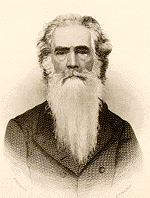Biographical Sketch of Henry T. Anderson
Text from Moore, W. T. (editor), Living Pulpit of the Christian
Church. Cincinnati: R. W. Carroll & Co., Publishers, 1871.
Pages 69-70. This online edition © 1995, James L. McMillan.
 Born: Caroline County, Virginia, January 27, 1812.
Born: Caroline County, Virginia, January 27, 1812.
Died: Washington, D. C., September 19, 1872.
THIS distinguished scholar and preacher needs no lengthy introduction to American readers. His
Translation of the New Testament has made his name quite familiar in this country, and he is not
altogether unknown in many portions of Europe.
HENRY T. ANDERSON was born in Caroline County, Virginia, on the 27th of January,
1812. His parents, who were also natives of Virginia, were Baptists, though quite liberal in their
views. Hence, Brother ANDERSON'S early religious training was nearly in harmony with the
position he now occupies. The Bible was the text-book, and its teachings had a very powerful
influence upon his youthful mind.
At the age of twenty-one he made the confession, and was immersed by his elder brother,
who had left the Baptists and united with the Disciples. By giving diligent attention to the study of
the Scriptures, he made such rapid progress in the Divine life that he began to preach in May,
1833, not more than ten months after his baptism.
His method of studying the Scriptures was such as left nothing unnoticed. The Bible was
read and re-read again and again. Every sentence was studied, both in the original and English,
with the most prayerful interest. Scripture was used to illustrate and explain Scripture, until every
subject in the Word of God was examined in the light of Divine Truth. This method of
investigation made his preaching didactic rather than hortatory, practical rather than ornamental.
Hence, in the popular style, he is not an orator. Nevertheless, his discourses are always highly
entertaining, because they are full of instruction, and delivered in an earnest, impressive style.
He remained in Virginia, preaching at various places in Caroline, Hanover, and some other
counties, until the year 1837, when he removed to Kentucky, and for several years taught school
and preached in the southern portion of the State. In November, 1847, he took charge of the
Walnut-street Church in Louisville, and continued there six years. After this he was engaged for
about eight years in teaching classical schools, and preaching the Gospel in various parts of the
State. In December, 1861, he began to translate the New Testament, a work upon which his
reputation chiefly rests. For many years he had made the New Testament original a constant
study. He had been blessed in early life with a fine classical education; and such was his devotion
to the Greek, that, when he began to make his translation, it was equally as familiar to him as the
English. Of the translation itself we need not speak, except to say that it has been pronounced by
competent judges the best in the English language. Whether this be true or not, it certainly has
superior merits, and will doubtless take a high position among standard works of its kind. He is
now engaged in giving an exact translation of the text of Tischendorf. His present home is in
Harrodsburg, Ky., where he has preached for the Church for several years.
His prominent characteristics are originality of thought, simplicity of manner, and great
faith in the providence of God. He is emphatically a thinker, and every thing that he says gives
unmistakable evidence that he is not satisfied to simply appropriate the labor of others. He seeks
the foundation of things, and though his views may not always be correct, they are always highly
suggestive.
His whole nature is childlike. The most perfect simplicity marks every thing he does. His
purposes are as transparent as light itself. No one could be freer from affectation. But that which
distinguishes him above every thing else is his wonderful faith in God. We do not think we have
ever known a man who gives himself more unreservedly into the hands of his Heavenly Father. In
this world's goods he has been poor all his life, but he has certainly been rich in faith. The
circumstances under which he began his translation afford a fine illustration of this peculiarity.
Having a large family to support, with a salary not exceeding six hundred dollars, and no other
means that he could command, there was little prospect that he could do any thing beyond
supplying the necessities of the hour. But he had faith in God, and entered upon the work with full
confidence that the"Lord would provide." In speaking of this subject, in 1863, he says: "The Lord
raised me up friends. Some from a distance sent me a few dollars. Two worthy sisters paid one
hundred and twenty dollars each last year. Those near me have, some of them, remembered my
wants, and generously supplied me with food and clothing. Though the war swept away what
little I had, God has never forsaken me. I have a Father in heaven, a Redeemer at his right hand.
My prayers have been heard. Friends are near me, and I live, a monument of the truth that God
will not forsake those who put their trust in him."
Back to H. T. Anderson Page |
Back to W. T. Moore Page
Back to Biographies at the Restoration Movement Pages
Back to Main Restoration Movement Page